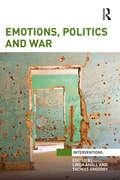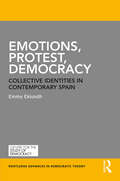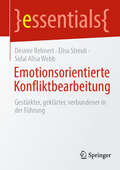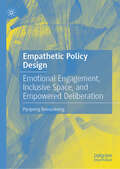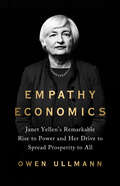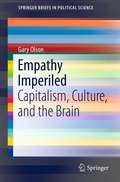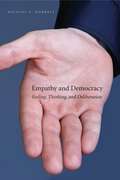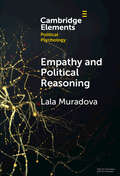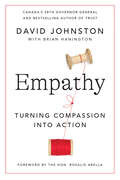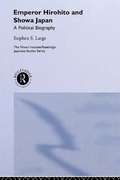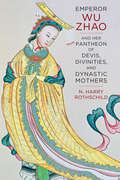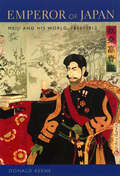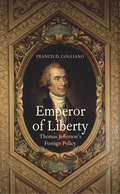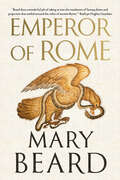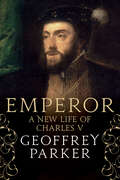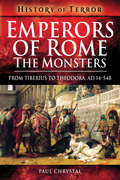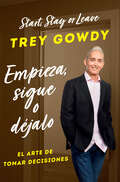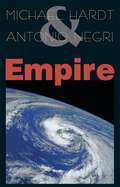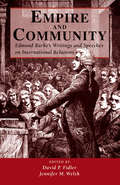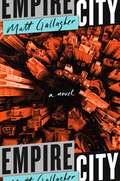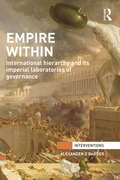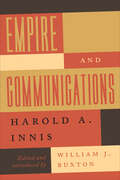- Table View
- List View
Emotions, Politics and War (Interventions)
by Linda Åhäll Thomas GregoryA growing number of scholars have sought to re-centre emotions in our study of international politics, however an overarching book on how emotions matter to the study of politics and war is yet to be published. This volume is aimed at filling that gap, proceeding from the assumption that a nuanced understanding of emotions can only enhance our engagement with contemporary conflict and war. Providing a range of perspectives from a diversity of methodological approaches on the conditions, maintenance and interpretation of emotions, the contributors interrogate the multiple ways in which emotions function and matter to the study of global politics. Accordingly, the innovative contribution of this volume is its specific engagement with the role of emotions and constitution of emotional subjects in a range of different contexts of politics and war, including the gendered nature of war and security; war traumas; post-conflict reconstruction; and counterinsurgency operations. Looking at how we analyse emotions in war, why it matters, and what emotions do in global politics, this volume will be of interest to students and scholars of critical security studies and international relations alike.
Emotions, Protest, Democracy: Collective Identities in Contemporary Spain (Routledge Advances in Democratic Theory)
by Emmy EklundhWith the rise of both populist parties and social movements in Europe, the role of emotions in politics has once again become key to political debates, and particularly in the Spanish case. Since 2011, the Spanish political landscape has been redrawn. What started as the Indignados movement has now transformed into the party Podemos, which claims to address important deficits in popular representation. By creating space for emotions, the movement and the party have made this a key feature of their political subjectivity. Emotions and affect, however, are often viewed as either purely instrumental to political goals or completely detached from ‘real’ politics. This book argues that the hierarchy between the rational and the emotional works to sediment exclusionary practices in politics, deeming some forms of political expressions more worthy than others. Using radical theories of democracy, Emmy Eklundh masterfully tackles this problem and constructs an analytical framework based on the concept of visceral ties, which sees emotions and affect as constitutive of any collective identity. She later demonstrates empirically, using both ethnographic method and social media analysis, how the movement Indignados is different from the political party Podemos with regards to emotions and affect, but that both are suffering from a broader devaluation of emotional expressions in political life. Bridging social and political theory, Emotions, Protest, Democracy: Collective Identities in Contemporary Spain provides one of the few in-depth accounts of the transition from the movement Indignados to party Podemos, and the role of emotions in contemporary Spanish and European politics.
Emotionsorientierte Konfliktbearbeitung: Gestärkter, geklärter, verbundener in der Führung (essentials)
by Désirée Rehnert Elisa Streuli Sidal Alisa WebbKonflikte sind ständige Begleiter in unserer Arbeitswelt. Sie weisen auf Schwachstellen der Organisation hin und zeigen Weiterentwicklungsmöglichkeiten auf. Gleichzeitig sind sie für die Beteiligten oft enorm belastend. Dieses Buch präsentiert anhand konkreter Praxisbeispiele Modelle und Werkzeuge zur effektiven Konfliktbewältigung aus der Führungsrolle. Profitieren Sie von fundierten Strategien der Emotionsregulation und der wirksamen Kommunikation. Auf diese Weise gelingt es Ihnen, Konflikte lösungsorientiert zu bearbeiten und sie als Chance für eine geklärte und gestärkte Zusammenarbeit zu nutzen.
Empathetic Policy Design: Emotional Engagement, Inclusive Space, and Empowered Deliberation
by Piyapong BoossabongThis book sets out to develop a policy design process that is more inclusive by creating space for emotions and feelings. Rather than focus solely on expert knowledge, it places the fears and hopes of citizens at the heart of policy design, to facilitate meaningful interactions between policymakers and the citizens they serve. Focusing particularly on evidence from Thailand, but drawing on case studies from around the world, the book argues that empathetic policy design is crucial to foster social learning and better-informed policies. It also focuses on how emotions can be incorporated into policy design, and how policymakers of the future might use these design processes to create and implement policies that will benefit all. The book will appeal to all those interested in public policy and policy design.
Empathy Economics: Janet Yellen's Remarkable Rise to Power and Her Drive to Spread Prosperity to All
by Owen UllmannNamed one of Investopedia's 7 Best Economics Books of 2022The trailblazing story of Janet Yellen, the Ruth Bader Ginsburg of economics, and her lifelong advocacy for an economics of empathy that delivers the fruits of a prosperous society to people at the bottom half of the economic ladder. When President Biden announced Janet Yellen as his choice for secretary of the treasury, it was the peak moment of a remarkable life. Not only the first woman in the more than two-century history of the office, Yellen is the first person to hold all three top economic policy jobs in the United States: chair of both the Federal Reserve and the President&’s Council of Economic Advisors as well as treasury secretary. Through Owen Ullmann&’s intimate portrait, we glean two remarkable aspects of Yellen&’s approach to economics: first, her commitment to putting those on the bottom half of the economic ladder at the center of economic policy, and employing forward-looking ideas to use the power of government to create a more prosperous, productive life for everyone. And second, her ability to maintain humanity in a Washington policy world where fierce political combat casts others as either friend or enemy, never more so than in our current age of polarization. As Ullmann takes us through Yellen&’s life and work, we clearly see her brilliance and meticulous preparation. What stands out, though, is Yellen as an icon of progress—the &“Ruth Bader Ginsburg of economics&”—a superb-yet-different kind of player in a cold, male-dominated profession that all too often devises policies to benefit the already well-to-do. With humility and compassion as her trademarks, we see the influence of Yellen&’s father, a physician whose pay-what-you-can philosophy meant never turning anyone away. That compassion, rooted in her family life in Brooklyn, now extends across our entire country.
Empathy Imperiled
by Gary OlsonThe most critical factor explaining the disjuncture between empathy's revolutionary potential and today's empathically-impaired society is the interaction between the brain and our dominant political culture. The evolutionary process has given rise to a hard-wired neural system in the primal brain and particularly in the human brain. This book argues that the crucial missing piece in this conversation is the failure to identify and explain the dynamic relationship between an empathy gap and the hegemonic influence of neoliberal capitalism, through the analysis of the college classroom, the neoliberal state, media, film and photo images, marketing of products, militarization, mass culture and government policy. This book will contribute to an empirically grounded dissent from capitalism's narrative about human nature. Empathy is putting oneself in another's emotional and cognitive shoes and then acting in a deliberate, appropriate manner. Perhaps counter-intuitively, it requires self-empathy because we're all products of an empathy-anesthetizing culture. The approach in this book affirms a scientific basis for acting with empathy, and it addresses how this can help inform us to our current political culture and process, and make its of interest to students and scholars in political science, psychology, and other social sciences.
Empathy and Democracy: Feeling, Thinking, and Deliberation
by Michael E. MorrellDemocracy harbors within it fundamental tensions between the ideal of giving everyone equal consideration and the reality of having to make legitimate, binding collective decisions. Democracies have granted political rights to more groups of people, but formal rights have not always guaranteed equal consideration or democratic legitimacy. It is Michael Morrell’s argument in this book that empathy plays a crucial role in enabling democratic deliberation to function the way it should. Drawing on empirical studies of empathy, including his own, Morrell offers a “process model of empathy” that incorporates both affect and cognition. He shows how this model can help democratic theorists who emphasize the importance of deliberation answer their critics.
Empathy and Political Reasoning: How Empathy Promotes Reflection and Strengthens Democracy (Elements in Political Psychology)
by Lala MuradovaHow do individuals make up their mind about politics? This question has sparked a vigorous debate in the study of political behavior for the last few decades. Some scholars contend that citizens can and should engage in political reflection, while others highlight biases in human political reasoning that make reflection impossible. This Element is about the conditions under which citizens can be motivated to transcend their egocentric biases and engage in reflection. Rather than asking whether citizens are capable of reflection, it shifts focus to a more productive question: how to motivate reflection. Firstly, it argues that (situational) empathy for the other side can inspire citizens to think reflectively about politics. Secondly, the Element proposes that deliberative institutions have the potential to evoke empathy for the other side in individuals. Thirdly, it draws on experimental and qualitative data from Belgium, Chile, Ireland, and the UK to test the theoretical expectations.
Empathy: Turning Compassion into Action
by David JohnstonThe 28th Governor General's most personal and timely book to date: a passionate and practical guide for turning empathy into action.As the world stumbles through the most severe pandemic of the last century, threatened by teetering economies, torn by political division, separated by unequal access to resources, and wrestling with issues as diverse as racism, gender, cybercrime, and climate change, the nations that best adapt and prosper are those in which empathy is fully alive and widely active. Written for a post-pandemic world, Empathy is a book about learning to be empathetic and then turning that empathy into action. Based on the personal experiences of author David Johnston, the book explores how awakening to the transformative power of listening and caring permanently changes individuals, families, communities, and nations. A how-to manual for a world craving kindness, Empathy offers proof of the inherent goodness of people, and shows how exercising the instinct for kindness creates societies that are both smart and caring. Through poignant stories and crisp observations, David contends that &“Everyone has power over some things that other people don&’t. When they learn ways to turn that power into action, they change the future dramatically.&” With clear and practical focus, Empathy looks at a host of issues that demand our attention, from education and immigration, to healthcare, the law, policing, business ethics, and criminal justice. In each of these areas, Johnston highlights the deeper understandings that have arisen during the COVID-19 crisis, with sharp emphasis on the positive and negative lessons now in crisp focus. Convinced that empathy is the fastest route to peace and progress in all their forms, David ends each short chapter with a set of practical steps the reader can take to make the world better, one deliberate action at a time.
Emperor Hirohito and Showa Japan: A Political Biography (Nissan Institute/Routledge Japanese Studies)
by Stephen LargeEmperor Hirohito reigned for more than sixty years, yet we know little about him or the part he really played in the turbulent history of Showa Japan.Stephen Large draws on a wide range of Japanese and Western sources in his study of Emperor Hirohito's political role in Showa Japan (1926-89). This analysis focuses on key events in his career such as the extent to which he bore responsibility for Japanese aggression in the Pacific in 1941, and explains why Hirohito remains such a contested symbol in Japanese post war politics.
Emperor Wu Zhao and Her Pantheon of Devis, Divinities, and Dynastic Mothers
by Norman H. RothschildWu Zhao (624--705), better known as Wu Zetian or Empress Wu, is the only woman to have ruled China over the course of its 5,000-year history. How did she rise to power, and why was she never overthrown? Exploring a mystery that has confounded scholars for centuries, this multifaceted history suggests that Wu Zhao drew on China's rich pantheon of female divinities and eminent women to aid in her reign.Wu Zhao could not obtain political authority through conventional channels, but she could afford to ignore norms and tradition. Deploying language, symbol, and ideology, she harnessed the cultural resonance, maternal force, divine energy, and historical weight of Buddhist devis, Confucian exemplars, Daoist immortals, and mythic goddesses, establishing legitimacy within and beyond the confines of Confucian ideology. Tapping into deep, powerful subterranean reservoirs of female power, Wu Zhao built a pantheon of female divinities carefully calibrated to meet her needs at court. Her pageant was promoted in scripted rhetoric, reinforced through poetry, celebrated in theatrical productions, and inscribed on steles. Rendered with deft political acumen and aesthetic flair, these affiliations significantly enhanced Wu Zhao's authority and cast her as the human vessel through which the pantheon's divine energy flowed. Her strategy is a model of political brilliance and proof that medieval Chinese women enjoyed a more complex social status than previously known.
Emperor Wu Zhao and Her Pantheon of Devis, Divinities, and Dynastic Mothers (The Sheng Yen Series in Chinese Buddhist Studies)
by N. Harry RothschildWu Zhao (624–705), better known as Wu Zetian or Empress Wu, is the only woman to have ruled China as emperor over the course of its 5,000-year history. How did she—in a predominantly patriarchal and androcentric society—ascend the dragon throne? Exploring a mystery that has confounded scholars for centuries, this multifaceted history suggests that China's rich pantheon of female divinities and eminent women played an integral part in the construction of Wu Zhao's sovereignty. Wu Zhao deftly deployed language, symbol, and ideology to harness the cultural resonance, maternal force, divine energy, and historical weight of Buddhist devis, Confucian exemplars, Daoist immortals, and mythic goddesses, establishing legitimacy within and beyond the confines of Confucian ideology. Tapping into powerful subterranean reservoirs of female power, Wu Zhao built a pantheon of female divinities carefully calibrated to meet her needs at court. Her pageant was promoted in scripted rhetoric, reinforced through poetry, celebrated in theatrical productions, and inscribed on steles. Rendered with deft political acumen and aesthetic flair, these affiliations significantly enhanced Wu Zhao's authority and cast her as the human vessel through which the pantheon's divine energy flowed. Her strategy is a model of political brilliance and proof that medieval Chinese women enjoyed a more complex social status than previously known.
Emperor of Japan: Meiji and His World, 1852–1912
by Donald KeeneThe renowned Japanese scholar &“brings us as close to the inner life of the Meiji emperor as we are ever likely to get&” (The New York Times Book Review). When Emperor Meiji began his rule in 1867, Japan was a splintered empire dominated by the shogun and the daimyos, cut off from the outside world, staunchly antiforeign, and committed to the traditions of the past. Before long, the shogun surrendered to the emperor, a new constitution was adopted, and Japan emerged as a modern, industrialized state. Despite the length of his reign, little has been written about the strangely obscured figure of Meiji himself, the first emperor ever to meet a European. But now, Donald Keene sifts the available evidence to present a rich portrait not only of Meiji but also of rapid and sometimes violent change during this pivotal period in Japan&’s history. In this vivid and engrossing biography, we move with the emperor through his early, traditional education; join in the formal processions that acquainted the young emperor with his country and its people; observe his behavior in court, his marriage, and his relationships with various consorts; and follow his maturation into a &“Confucian&” sovereign dedicated to simplicity, frugality, and hard work. Later, during Japan&’s wars with China and Russia, we witness Meiji&’s struggle to reconcile his personal commitment to peace and his nation&’s increasingly militarized experience of modernization. Emperor of Japan conveys in sparkling prose the complexity of the man and offers an unrivaled portrait of Japan in a period of unique interest. &“Utterly brilliant . . . the best history in English of the emergence of modern Japan.&”—Los Angeles Times
Emperor of Liberty
by Francis D. CoglianoThis book, the first in decades to closely examine Thomas Jefferson’s foreign policy, offers a compelling reinterpretation of his attitudes and accomplishments as a statesman during America’s early nationhood. Beginning with Jefferson’s disastrous stint as wartime governor of Virginia during the American Revolution, and proceeding to his later experiences as a diplomat in France, Secretary of State, and U. S. Vice President, historian Francis Cogliano considers how these varied assignments shaped Jefferson’s thinking about international relations. The author then addresses Jefferson’s two terms as President#151;his goals, the means he employed to achieve them, and his final record as a statesman. Cogliano documents the evolution of Jefferson’s attitudes toward the use of force and the disposition of state power. He argues that Jefferson, although idealistic in the ends he sought to achieve, was pragmatic in the means he employed. Contrary to received wisdom, Jefferson was comfortable using deadly force when he deemed it necessary and was consistent in his foreign policy ends#151;prioritizing defense of the American republic above all else. His failures as a statesman were, more often than not, the result of circumstances beyond his control, notably the weakness of the fledgling American republic in a world of warring empires.
Emperor of Rome: Ruling The Ancient Roman World
by Mary BeardINSTANT NEW YORK TIMES BESTSELLER Best Books of 2023: New Yorker, The Economist, Smithsonian Most Anticipated Books of Fall: Washington Post, Los Angeles Times, TODAY, Literary Hub, and Publishers Weekly "A vivid way to re-examine what we know, and don’t, about life at the top.... Emperor of Rome is a masterly group portrait, an invitation to think skeptically but not contemptuously of a familiar civilization." —Kyle Harper, Wall Street Journal A sweeping account of the social and political world of the Roman emperors by “the world’s most famous classicist” (Guardian). In her international bestseller SPQR, Mary Beard told the thousand-year story of ancient Rome, from its slightly shabby Iron Age origins to its reign as the undisputed hegemon of the Mediterranean. Now, drawing on more than thirty years of teaching and writing about Roman history, Beard turns to the emperors who ruled the Roman Empire, beginning with Julius Caesar (assassinated 44 BCE) and taking us through the nearly three centuries—and some thirty emperors—that separate him from the boy-king Alexander Severus (assassinated 235 CE). Yet Emperor of Rome is not your typical chronological account of Roman rulers, one emperor after another: the mad Caligula, the monster Nero, the philosopher Marcus Aurelius. Instead, Beard asks different, often larger and more probing questions: What power did emperors actually have? Was the Roman palace really so bloodstained? What kind of jokes did Augustus tell? And for that matter, what really happened, for example, between the emperor Hadrian and his beloved Antinous? Effortlessly combining the epic with the quotidian, Beard tracks the emperor down at home, at the races, on his travels, even on his way to heaven. Along the way, Beard explores Roman fictions of imperial power, overturning many of the assumptions that we hold as gospel, not the least of them the perception that emperors one and all were orchestrators of extreme brutality and cruelty. Here Beard introduces us to the emperor’s wives and lovers, rivals and slaves, court jesters and soldiers, and the ordinary people who pressed begging letters into his hand—whose chamber pot disputes were adjudicated by Augustus, and whose budgets were approved by Vespasian, himself the son of a tax collector. With its finely nuanced portrayal of sex, class, and politics, Emperor of Rome goes directly to the heart of Roman fantasies (and our own) about what it was to be Roman at its richest, most luxurious, most extreme, most powerful, and most deadly, offering an account of Roman history as it has never been presented before.
Emperor: A New Life of Charles V
by Geoffrey ParkerThis “elegant and engaging” biography dramatically reinterprets the life and reign of the sixteenth-century Holy Roman Emperor: “a masterpiece” (Susannah Lipscomb, Financial Times).The life of Emperor Charles V (1500–1558), ruler of Spain, Germany, the Netherlands, and much of Italy and Central and South America, has long intrigued biographers. But capturing the nature of this elusive man has proven notoriously difficult—especially given his relentless travel, tight control of his own image, and the complexity of governing the world’s first transatlantic empire.Geoffrey Parker, one of the world’s leading historians of early modern Europe, has examined the surviving written sources in Dutch, French, German, Italian, Latin, and Spanish, as well as visual and material evidence. In Emperor, he explores the crucial decisions that created and preserved this vast empire, analyzes Charles’s achievements within the context of both personal and structural factors, and scrutinizes the intimate details of the ruler’s life for clues to his character and inclinations. The result is a unique biography that interrogates every dimension of Charles’s reign and views the world through the emperor’s own eyes.
Emperors of Rome: From Tiberius to Theodora, AD 14–548 (History of Terror)
by Paul ChrystalAs with everything else, there were good and bad Roman emperors. The good, like Trajan (98117), Hadrian (117138), Antoninus Pius (138161) and Marcus Aurelius (161180) were largely civilized and civilizing. The bad, on the other hand, were sometimes nothing less than monsters, exhibiting varying degrees of corruption, cruelty, depravity and insanity. It is a sobering thought that these ogres were responsible for governing the greatest civilization in the world, simultaneously terrorizing, brutalizing and massacring. Tiberius, Caligula, Nero, Domitian, Commodus, Caracella, Elagabalus, Septimius Severus, Diocletian, Maximinus Thrax, Justinian and Theodora all had more bad days than good; they are all covered in this book.Their exploits have, of course, been well documented since classical times but much of the coverage can only be called gratuitous, sensationalist or tabloid. This book is different because it is based on primary sources and evidence and attempts to balance out the shocking with any mitigating aspects in each of their lives. Many of our monsters have some redeeming factors and it is important that these are exposed if a true record of their lives is to be conveyed. The book also examines how each of the twelve has been treated for posterity in literature, theatre and film, and the lessons intended to be drawn from popular culture through the ages.
Empieza, sigue o déjalo / Start, Stay or Leave
by Trey GowdyEl presentador de televisión y autor bestseller del New York Times comparte su confiable método de toma de decisiones, nos cuenta la historia de su vida y las elecciones que ha hecho. "La mejor guía que he leído para ayudar a las personas a analizar, tomar y asumir sus decisiones... Toma una gran decisión y lee este libro" —Dana Perino, presentadora de Fox News, exsecretaria de prensa de la Casa Blanca En la vida surgen momentos en los que tienes que decidir tu próximo paso: aceptar un nuevo trabajo, comprar una casa o comenzar una relación, ¿cómo decides qué dirección tomar? Trey Gowdy ha descubierto que la mayoría de las decisiones más importantes se reducen a tres opciones simples: Empezar, seguir o dejarlo.Gowdy desarrolló esta herramienta de toma de decisiones por primera vez en el tribunal durante un juicio federal por asesinato, y desde entonces ha guiado su vida. Este marco práctico le ha ayudado a decidir dónde criar a su familia, cuándo dejar su trabajo soñado, si postularse al Congreso y cuándo alejarse de la vida política. A lo largo de los años, Gowdy ha tomado algunas decisiones excelentes y otras pésimas (admite ambas). En Start, Stay, or Leave (Empieza, sigue o déjalo) comparte su sabiduría ganada con esfuerzo. Lleno de ideas y preguntas sorprendentes, este manual personal te enseña cómo: • Crear tu visión única del éxito.• Consultar tus sueños con sabiduría (y saber cuándo revisarlos). • Evaluar el precio que vale la pena pagar para alcanzar tus metas. • Equilibrar la lógica, la emoción y el miedo al enfrentar un nuevo desafío. • Seguir el consejo adecuado de las personas correctas (y bloquear a todos los demás). • Trazar el rumbo de tu vida con el objetivo final en mente. Leer Start, Stay, or Leave (Empieza, sigue o déjalo) es como sentarse en el porche trasero de una granja y charlar con un amigo sabio. Lleno de humor, desamor, consejos prácticos una historia de vida, este libro te enseñará cómo abordar decisiones que cambian la trayectoria con confianza y con el conocimiento de que, pase lo que pase, has tomado la mejor elección posible.
Empire
by Michael Hardt Antonio NegriImperialism as we knew it may be no more, but empire is alive and well. It is, as the authors demonstrate in this work the new political order of globalization. It is easy to recognise the contemporary economic, cultural, and legal transformations taking place across the globe but difficult to understand them. Hardt and Negri contend that they should be seen in line with our historical understanding of empire as a universal order that accepts no boundaries or limits. Their book shows how this emerging empire is fundamentally different from the imperialism of European dominance and capitalist expansion in previous eras. Rather, today's empire draws on elements of US constitutionalism, with its tradition of hybrid identities and expanding frontiers.
Empire And Community: Edmund Burke's Writings And Speeches On International Relations
by David P. FidlerEdmund Burke has long been regarded as one of the most important political thinkers of the late eighteenth century, and his writings and speeches continue to inspire and challenge to the present day. But Burke's thinking on international relations has not been fully addressed by the scholarly community. This situation is ironic given that so much of Burke's political efforts and thoughts were directed at international events and controversies, particularly British policies toward Ireland, America, India, and revolutionary France.David Fidler and Jennifer Welsh provide the first comprehensive presentation of Burke's thinking on international relations in Empire and Community: Edmund Burke's Writings and Speeches on International Relations. They analyze in detail Burke's perspective on international relations developed during his long and distinguished parliamentary career, establishing him as a ?classical thinker? on international relations; they also analyze where Burke's perspective on international relations belongs theoretically in the contemporary study of the subject. These analyses are followed by edited selections from Burke's writings and speeches on Ireland, America, India, and the French Revolution. Empire and Community gives Burke's thinking on international relations the emphasis and scholarly attention it deserves.
Empire Builders: An Illustrated History of the Rise and Fall of Cleveland's Van Sweringen Brothers
by Lauren R. PaciniEmpire Builders tells the story of Oris P. and Mantis J. Sweringen, two brothers from Wooster, Ohio, in the late nineteenth and early twentieth centuries. Although they were born into abject poverty, Oris was an extraordinary visionary who, with the help of his devoted younger brother, amassed a vast fortune in real estate and railroad developments. Their major breakthrough came in 1913 with the establishment of Shaker Heights, an affluent garden suburb connected by a brand-new interurban railroad to the booming midwestern metropolis of Cleveland. The Van Sweringens' ascension after Shaker Heights was meteoric, and it culminated with the construction of the 52-story Terminal Tower in downtown Cleveland in 1927. However, the country's economy came crashing down after the 1929 stock market collapse, and their empire crumbled around them. Empire Builders is the first new biography of the Van Sweringen brothers in more than twenty years. In it, architectural photographer and local history author Lauren R. Pacini tells the remarkable story of the Van Sweringen brothers through words and images. This richly illustrated volume features more than 150 new photographs of the still-fabulous historic homes the brothers built throughout greater Cleveland.The foreword is written by John J. Grabowski.
Empire City: A Novel
by Matt Gallagher&“Empire City is a dark, nimble book that pulls no punches. While the novel tracks an alternate historical reality, time and again I found myself taken aback at just how prescient and applicable its insight is to our very real present. Gallagher once again establishes himself as a preeminent voice in American writing.&” —Sara Novic, award-winning author of Girl at War &“A brilliant and daring novel. Gallagher&’s prose is sharp, energetic and witty, his characters are fiercely alive, and the cracked vision of America he creates is a monstrous thing of beauty.&” —Phil Klay, award-winning author of Redeployment The author of the &“urgent and deeply moving&” (The New York Times) Youngblood returns with this bold and provocative novel following a group of super-powered soldiers and civilians as they navigate an imperial America on the precipice of a major upheaval—for fans of The Fortress of Solitude and The Plot Against America. Thirty years after its great triumph in Vietnam, the United States has again become mired in an endless foreign war overseas. Stories of super soldiers known as the Volunteers tuck in little American boys and girls every night. Yet domestic politics are aflame. Violent protests erupt throughout the nation; an ex-military watchdog group clashes with police while radical terrorists threaten to expose government experiments within the veteran rehabilitation colonies. Halfway between war and peace, the Volunteers find themselves waiting for orders in the vast American city-state, Empire City. There they encounter a small group of civilians who know the truth about their powers, including Sebastian Rios, a young bureaucrat wrestling with survivor guilt, and Mia Tucker, a wounded army pilot-turned-Wall Street banker. Meanwhile, Jean-Jacques Saint-Preux, a Haitian-American Volunteer from the International Legion, decides he&’ll do whatever it takes to return to the front lines. Through it all, a controversial retired general emerges as a frontrunner in the presidential campaign, promising to save the country from itself. Her election would mean unprecedented military control over the country, with promises of security and stability—but at what cost? Featuring Gallagher&’s &“vital&” (The Washington Post), &“evocative&” (The Wall Street Journal) prose, Empire City is a rousing vision of an alternate—yet all too familiar—America on the brink.
Empire Films and the Crisis of Colonialism, 1946–1959
by Jon CowansThe first transnational history of cinema’s role in decolonization.Using popular cinema from the United States, Britain, and France, Empire Films and the Crisis of Colonialism, 1946–1959, examines postwar Western attitudes toward colonialism and race relations. Historians have written much about the high politics of decolonization but little about what ordinary citizens thought about losing their empires. Popular cinema provided the main source of images of the colonies, and, according to Jon Cowans in this far-reaching book, films depicting the excesses of empire helped Westerners come to terms with decolonization and even promoted the dismantling of colonialism around the globe.Examining more than one hundred British, French, and American films from the post–World War II era, Cowans concentrates on movies that depict interactions between white colonizers and nonwhite colonial subjects, including sexual and romantic relations. Although certain conservative films eagerly supported colonialism, Cowans argues that the more numerous "liberal colonialist" productions undermined support for key aspects of colonial rule, while a few more provocative films openly favored anticolonial movements and urged "internal decolonization" for people of color in Britain, France, and the United States.Combining new archival research on the films’ production with sharp analysis of their imagery and political messages, the book also assesses their reception through box-office figures and newspaper reviews. It examines both high-profile and lesser-known films on overseas colonialism, including The King and I, Bhowani Junction, and Island in the Sun, and tackles treatments of miscegenation and "internal colonialism" that appeared in Westerns and American films like Pinky and Giant. The first truly transnational history of cinema’s role in decolonization, this powerful book weaves a unified historical narrative out of the experiences of three colonial powers in diverse geographic settings.
Empire Within: International Hierarchy and its Imperial Laboratories of Governance (Interventions)
by Alexander D BarderThis book explores the reverberating impacts between historical and contemporary imperial laboratories and their metropoles through three case studies concerning violence, surveillance and political economy. The invasions of Afghanistan in 2001 and Iraq in 2003 forced the United States to experiment and innovate in considerable ways. Faced with growing insurgencies that called into question its entire mission, the occupation authorities engaged in a series of tactical and technological innovations that changed the way it combated insurgents and managed local populations. The book presents new material to develop the argument that imperial and colonial contexts function as a laboratory in which techniques of violence, population control and economic principles are developed which are subsequently introduced into the domestic society of the imperial state. The text challenges the widely taken for granted notion that the diffusion of norms and techniques is a one-way street from the imperial metropole to the dependent or weak periphery. This work will be of great interest to scholars of international relations, critical security studies and international relations theory.
Empire and Communications
by Harold A. InnisOriginally published in 1950, Harold A. Innis’s Empire and Communications is considered to be one of the classic works in media studies, yet its origins have received little attention. Ambitious in its scope, the book spans five millennia, tracing a path of development around the globe from 2900 BCE to the twentieth century and revealing the cyclical interplay between communications and power structures across space and time. In this new edition, William J. Buxton pays close attention to handwritten glosses that Innis added to a copy of the original edition and the revisions undertaken by his widow, Mary Q. Innis. A new introduction provides a detailed account of how the book emerged from lectures that Innis delivered at Oxford University in 1948, as well as how it related to other presentations Innis made in Britain during the same period. It explores how Innis sought to enrich his analysis by incorporating material related to phenomena such as war, education, religion, culture, geography, and finance. An insightful foreword by Marshall McLuhan is included, as well as bibliographical references and a revised index. By providing a narrative based on extensive notes from Innis, this edition makes Empire and Communications more accessible and contributes to the broad efforts to shape Innis’s legacy.
